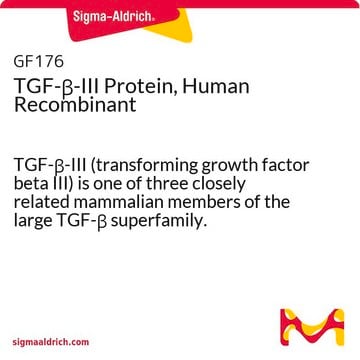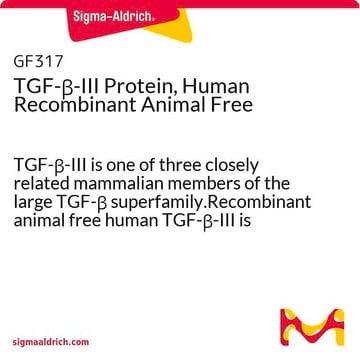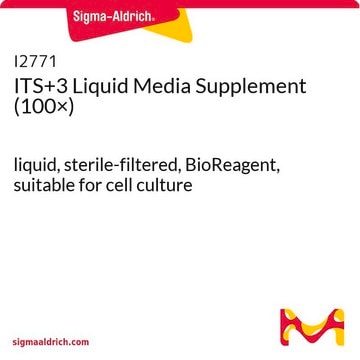T5425
Transforming Growth Factor-β3 human
≥97% (SDS-PAGE), recombinant, expressed in baculovirus infected Sf21 cells, powder, suitable for cell culture
Synonym(s):
hTGF-β3, TGF-β3
About This Item
Recommended Products
product name
Transforming Growth Factor-β3 human, TGF-β3, recombinant, expressed in baculovirus infected Sf21 cells, powder, suitable for cell culture
biological source
human
Quality Level
recombinant
expressed in baculovirus infected Sf21 cells
Assay
≥97% (SDS-PAGE)
form
powder
potency
0.01-0.09 ng/mL ED50/EC50
quality
endotoxin tested
mol wt
predicted mol wt ~25 kDa
packaging
pkg of 2 μg
storage condition
avoid repeated freeze/thaw cycles
technique(s)
cell culture | mammalian: suitable
impurities
<0.01 EU/μg
UniProt accession no.
storage temp.
−20°C
Gene Information
human ... TGFB3(7043)
Looking for similar products? Visit Product Comparison Guide
General description
Application
Biochem/physiol Actions
Physical form
Analysis Note
Storage Class Code
11 - Combustible Solids
WGK
WGK 3
Flash Point(F)
Not applicable
Flash Point(C)
Not applicable
Personal Protective Equipment
Certificates of Analysis (COA)
Search for Certificates of Analysis (COA) by entering the products Lot/Batch Number. Lot and Batch Numbers can be found on a product’s label following the words ‘Lot’ or ‘Batch’.
Already Own This Product?
Find documentation for the products that you have recently purchased in the Document Library.
Customers Also Viewed
Our team of scientists has experience in all areas of research including Life Science, Material Science, Chemical Synthesis, Chromatography, Analytical and many others.
Contact Technical Service








